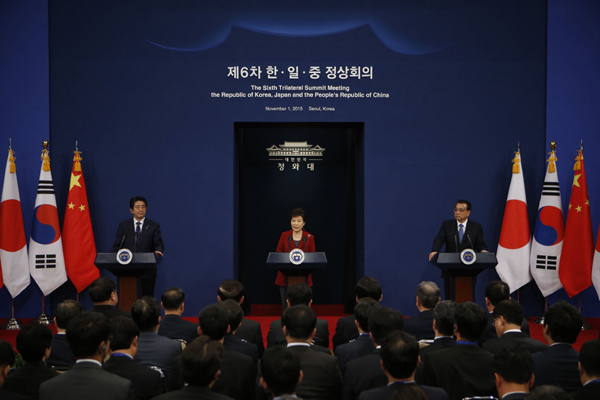Asian giants should join forces, premier says
By ZHANG YUNBI/ZHAO YINAN (China Daily) Updated: 2015-11-02 07:46
Premier Li Keqiang has called for strengthened cooperation among China, Japan and the Republic of Korea at the fifth China-Japan-ROK Business Summit.
Li made the comments when addressing business leaders from the three countries along with ROK President Park Geun-hye and Japanese Prime Minister Shinzo Abe. He said such cooperation will bring Asia forward and even boost the recovery of global economy.
Li said China welcomes companies from Japan and the ROK for investments, the three countries are complementary to each other economically and future trilateral cooperation with third parties is welcomed.
Park said the Northeast Asia region has become the third-largest market in the world, following the European Union and North America, and the potential for trilateral cooperation is enormous.
Abe noted that the three countries have served as a locomotive of the development of the region, and the trilateral FTA and Regional Comprehensive Economic Partnership are of great significance to both the Asian economy and the global economy.
First held in 2009, the leaders' summit has served as a top-level exchange and an effective platform to propose policies to the three governments.
The gathering this year was to focus on "new challenges and opportunities in the era of low growth" as well as "infrastructure development in Asia".
The three hosting trade associations from the three countries jointly signed a trilateral memorandum of understanding.
The three countries' combined annual GDP reached $16 trillion at the end of 2014, accounting for 21 percent of global GDP. Their combined imports and exports were $7 trillion, 20 percent of the global total in 2014.
Kiyoyuki Seguchi, research director at the Canon Institute for Global Studies in Tokyo, suggested that agencies of the three countries could conduct research on how to achieve cooperation between Chinese companies and ROK and Japanese businesses investing in China.
In particular, the three countries "should explore collaboration on international production capacity and dealing with third parties", Seguchi said.
"All three countries should jointly shape a corporate environment in order to boost their say and reputation in the global economic landscape," Seguchi said.
Masahiro Kawai, project professor of the Graduate School of Public Diplomacy at the University of Tokyo, said the trilateral Free Trade Agreement should be advanced although Japan would benefit the least from it. Such a pact would be good news for all three economies.
"The Regional Comprehensive Economic Partnership may be more influential to the development of China, Japan and the ROK (in comparison with the trilateral FTA), and it will benefit the ROK most," Kawai said.
Stronger economic cooperation among the three neighbors is significant because "common economic interests would boost the realization of common political interests", Kawai added.
Xu Dunxin, former vice-foreign minister and former Chinese ambassador to Japan, said the trilateral cooperation "profoundly shapes the landscapes in Asia and even the whole world" as the three countries account for a quarter of global population, one-fifth of the global economy and nearly half of the currency reserve worldwide.
Although China's GDP tops the other two neighbors, China is still a developing country, and "the prospect for mutual benefit is still expanding in both depth and breadth", Xu said.





